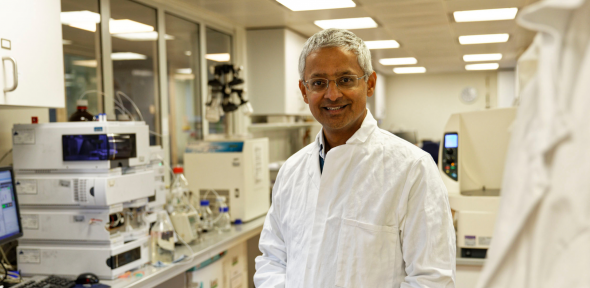
Image: Professor Sir Shankar Balasubramanian.
Biological systems
We are continuing to build on Cambridge's legendary history of using chemical research to solve fundamental biological problems. We use chemical strategies to understand these biological systems at a molecular level, and our discoveries could have significant human and economic impact in areas as diverse as medicinal chemistry and energy harvesting. Our researchers use a variety of chemical methodologies such as theory, informatics, chemical physics, spectroscopy, synthesis, protein and nucleic acid engineering through to manipulation of whole organisms. We are proud of our strong collaborations and joint programmes with biological departments and research institutes in and around Cambridge and beyond.
Our common themes
Biophysical and spectroscopic studies of macromolecule structure, dynamics and function
- Protein folding, misfolding, self-assembly and aggregation in health and disease (Barker, Bond, Clarke, Dobson, Fersht, Jackson, Klenerman, Knowles, Scherman, Wales, Vendrusculo)
- Nucleic Acid structures, their dynamic properties and epigenetics (Balasubramanian)
- Multi-protein complexes and protein-protein interactions (Jackson)
- Protein localisation and function in cells (Klenerman, Lee)
- Biofilm structure and function (Zhang)
- Gene editing and synthetic biology tool development (Willis)
- The development and application of new biophysical and computational methods methods for the study of macromolecular properties (Colwell, Duer, Klenerman, Knowles)
- Tissue structure and function (Duer)
Small molecule intervention in biological processes
- Fundamentals of small molecule recognition by protein and nucleic acid and the thermodynamics of drug discovery. (Abell, Barker, Balasubramanian, Bender, Bond, Jackson, Leeper, Wales)
- Medicinal chemistry: fragment based approaches; small molecules (Balasubramanian, Bender, Glen); metallodrugs (Barker, Boss); antimicrobials (Spring).
- Diagnosis and prevention of protein aggregation processes (Jackson, Scherman, Vendrusculo)
- Small molecule systems biology (Glen, Bender) and cellular probes (Bernardes, Leeper, Spring)
New biologically inspired catalysts, responsive materials and synthetic methodology applied to biological systems
- Evolution and synthesis of new catalytic biomolecules (Abell, Chin)
- Energy harvesting and transduction (Reisner, Barker, Scherman, Zhang)
- Synthetic methodology: Transformative synthesis (Bernardes, Ley, Gaunt); Combinatorial Chemistry (Spring), Enzyme and cofactor chemistry (Leeper), Inorganic methods (Boss, Reisner)
- Responsive peptide and protein nanomaterials (Barker, Dobson, Knowles, Scherman)

